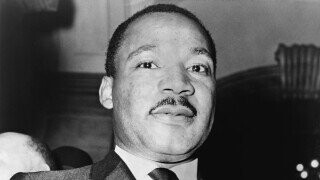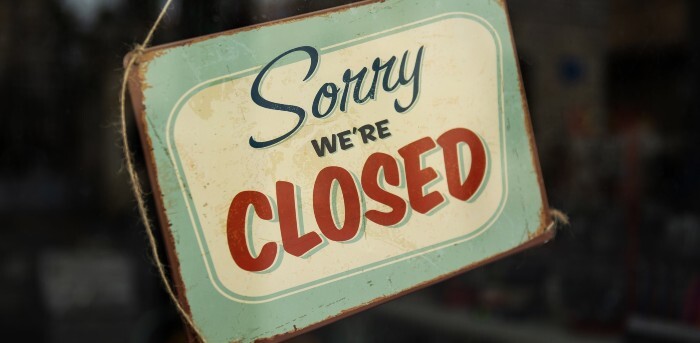15 Now-You-Know Details About Martin Luther King, Jr.'s Assassination

On April 4, 1968, James Earl Ray came at the king, and tragically, he did not miss. Well, maybe it was James Earl Ray. We’ll get to that, because it's just one of a number of amazing details about that day and its aftermath.
Jesse Jackson Was There

It turns out he was “one of closest aides.” In fact, he had a front row seat to the atrocity, as King was leaning over the balcony of his Memphis hotel room talking to Jackson when he was shot.
He Was There to Support Sanitation Workers

The only reason King was even in Memphis that day was to support a strike of the city’s sanitation workers, because no walkout was too dirty for King. It was to these workers that he delivered his now famous “I’ve Been to the Mountaintop” speech, and within a week of King’s death, the city gave in to their demands. After all, they would have looked real bad if they didn’t.
King’s Last Speech Foreshadowed His Death
The text of “I’ve Been to the Mountaintop,” King’s last public address, is pretty spooky in hindsight, especially the ending: “I’ve seen the promised land. I may not get there with you. But I want you to know tonight, that we, as a people, will get to the promised land. And I’m happy tonight. I’m not worried about anything. I’m not fearing any man. Mine eyes have seen the glory of the coming of the Lord.”
Everything Closed Down

After learning of King’s death, President Lyndon B. Johnson declared that April 7, three days later, would serve as a national day of mourning. Across the country, public buildings and businesses shut their doors to observe, and the nation’s children were probably very confused about why they were getting a snow day in spring.
Even the Oscars Rescheduled
The next day was supposed to be Hollywood’s biggest night, but everyone was so sad that they pushed the ceremony to two days later. It was one of only three other times in history that’s happened: after a devastating California flood in 1938, after the attempted assassination of Ronald Reagan in 1981, and due to the COVID-19 pandemic in 2021.
A Free James Brown Concert Appeased Rioters

Boston will riot over so much as a particularly egregious act of littering, so naturally, they joined cities across the country in making their outrage over King’s death excessively known. The next day, James Brown was scheduled to play in the city, and Boston’s mayor worried that drawing the city’s soul fans all to one spot wouldn’t help, so a city councilman suggested paying Brown to air the concert for free on TV instead. That night, there was even less chaos in the streets than a normal Friday night in Boston, let alone the one after the death of a beloved public figure.
It Wasn’t the First Attempt on King’s Life
Ten years earlier, King was stabbed in the chest at a book signing event by a woman who believed he was conspiring with communists against her personally. The knife was so close to slicing his aorta that he was, according to his surgeon, “a sneeze away from death.”
Ray Was Captured on the Other Side of the World

By the time witnesses and fingerprints on the identified murder weapon pointed to escaped convict James Earl Ray, he was long gone. First he went to Canada, where he procured a fake birth certificate and passport, then to England, where it didn’t take long for people to get suspicious of the Canadian guy with an obvious Southern accent and documents bearing different names.
King’s Family Doesn’t Believe Ray Killed Him

Ray later claimed that he confessed under coercion and only fled the country because he was, you know, an escaped con matching the description of the guy they were looking for. Amazingly, King’s family believes him, insisting King’s death was the result of a government conspiracy. The FBI did hassle and spy on King starting all the way back in the ‘50s, and they even tried to blackmail him into suicide, so it’s not as bananapants as it sounds.
No Trial Left Few Answers
Part of the King family’s beef about Ray is that they don’t think he got a fair trial, because he didn’t really get any trial. He pled guilty on the advice of his lawyer to avoid the death penalty, so no witnesses were called, Ray didn’t defend himself, and none of the answers that usually get unearthed during a trial came out. Later, a mock trial aired on HBO, where Ray gave his first public testimony, ended with the jury finding him not guilty.
The Mysterious Raoul

So if Ray didn’t kill King, how did his fingerprints end up on the gun? He claims he was set up by a shadowy figure named Raoul after agreeing only to buy a gun and rent a hotel room across the street from where King was killed and apparently not asking any questions. To be clear, there’s no evidence that Raoul exists, and Ray’s description of him changed multiple times.
U2 Got It Wrong

U2’s “Pride (In the Name of Love)” is a touching tribute to King, but the second verse starts “Early morning, April 4,” and King was shot at approximately six p.m. and died an hour later. It’s not like they couldn’t have said “early evening.” It’s the same number of syllables and everything.
It Took 15 Years to Get M.L.K. Day
Congressman John Conyers had actually pushed for a national holiday honoring King since before his death, but it always failed, so he kept introducing it every year just to be shot down for 15 years. He and his supporters had to collect six million signatures before Congress started to smile on him in 1983, but even then, the legislation was filibustered. Papers were thrown. It was a whole thing, but it finally passed.
There’s a Morbid Museum

If you’re looking to get haunted, you can visit the hotel where King was killed, which has been preserved as a museum, and even take a selfie leaning over the same railing as King when he was shot. Granted, that will probably come back to haunt you in a different way.
Civil Court Found the U.S. Government Liable For King’s Death

After a Memphis restaurant owner confessed (possibly in a cynical cash grab) to a conspiracy involving himself, local police, various federal agencies, and even this Raoul guy, King’s family sued them all in Memphis civil court -- and won. The court found the defendants liable for King’s death and awarded his estate $100, which isn’t much, but money is fleeting. Wikipedia entries are forever.
Top image: Library of Congress/Wikimedia Commons